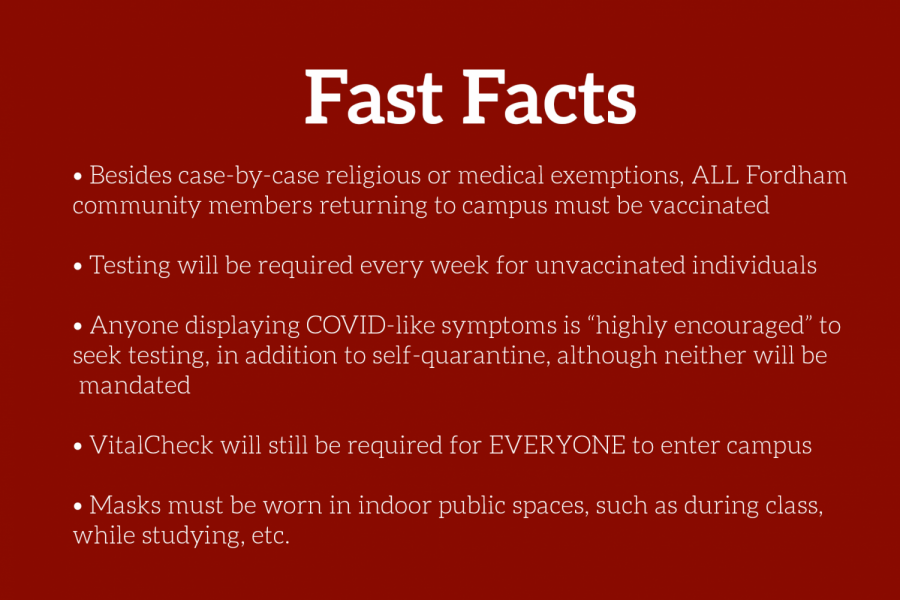University Officials Detail ‘Fordham Forward’ Health Guidelines
How Fordham’s administration plans to ensure a safe in-person semester
September 2, 2021
The long-awaited reopening of Fordham’s campuses for in-person classes does not mean total safety from the coronavirus.
Since the first few weeks of the COVID-19 pandemic back in March of 2020, Fordham has released a series of statements and guidelines under the moniker “Fordham Forward.”
Marco Valera, vice president of administration and COVID-19 coordinator, has had to juggle the changing scientific understanding of the virus while presenting a comprehensive strategy to prevent Fordham from suffering an outbreak. According to Valera, Fordham utilizes the guidance of the Centers for Disease Control and Prevention (CDC), New York City and State Departments of Health, and the American College Health Association.
“We are following the science around this virus: as the science has evolved, so have our policies and procedures,” Valera stated.
Testing
Fordham’s preventative measures include mandatory weekly testing for unvaccinated individuals and on-demand testing for students presenting symptoms for COVID-19. Fordham has replaced the former PCR tests with rapid antigen testing, although PCR testing kits will be used to verify negative results on rapid tests.
While Fordham has mandated that all students, faculty and staff be vaccinated, the university is providing medical exemptions for those who have an underlying medical issue.
Hours of operation have been significantly reduced to once a week between 10 a.m. to 3 p.m. Testing will be administered on Tuesdays only at Lincoln Center and Thursdays only at Rose Hill.
Vaccination Mandates
While Fordham has mandated that all students, faculty and staff be vaccinated, the university is providing medical exemptions for those who have an underlying medical issue. Religious exemptions are also available, but these are contingent on the university’s approval.
Although there are exceptions to the vaccine mandate, unvaccinated individuals will be barred from any and all indoor activities, including dining and entertainment spaces. The university has warned that forging, selling or attempting to pass off a fake vaccination card is a federal crime, and Fordham will report offenders to law enforcement.
Face Coverings
Fordham announced that all community members must wear face coverings — regardless of vaccination status — whenever indoors with at least one other person. Regardless of the political discourse over masks, scientific experts have maintained that masking in indoor group settings significantly reduces the transmission of COVID-19.
While effective, mask wearing alone is not sufficient to fully minimize the risk of infection. The CDC recommends mask wearing, social distancing and frequent hand washing to most effectively mitigate rates of transmission.
The university will offer free KN95 masks to anyone who needs them in Public Safety offices.
VitalCheck
The university continues to use VitalCheck, with University Health Services Director Maureen Keown affirming the university will continue to require all students to respond to daily notifications throughout the semester.
Keown called VitalCheck “a great addition to our measures in keeping the community safe, monitoring one’s health daily and keeping track of vaccination and testing.”
VitalCheck will also denote whether or not an individual is vaccinated; those who have shown valid proof of vaccination to the university have “Marked as Vaccinated” appear on their daily pass.
‘Each of Us Caring for the Whole of Us’
Although Fordham can only enforce these rules on campus, the university community will only be safe as long as students maintain public health protocols off campus.
At Lincoln Center in particular, nestled within one of the most densely populated areas in the country, the excitement of returning to New York can still very much be cut short, should the coronavirus manage to establish a foothold on campus. The university’s success in keeping the community safe from infection hinges heavily on the rules and mandates it has laid out over the duration of the COVID-19 pandemic.














